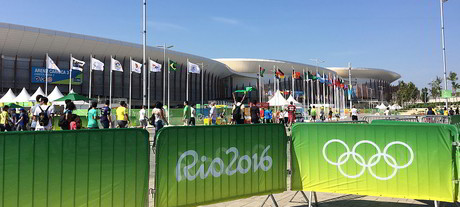Radio comms at the Olympics

Equipment from multiple vendors was used by federal and state agencies to ensure continuity of critical communications during the Rio Games.
Teltronic, Airbus Defence and Space and Motorola Solutions communications systems were in operation during the recent Olympic and Paralympic Games in Rio de Janeiro in Brazil.
A total of 30,000 users, making more than 300,000 calls per day, were successfully supported by Teltronic’s end-to-end solution, which comprises Nebula TETRA infrastructure, a CeCoCo control centre utilised by over 100 dispatch operators, four transportable high-traffic base stations and thousands of fixed, mobile and portable terminals.
A team of 20 systems engineers and technicians provided round-the-clock maintenance and operational support, including resource planning and real-time optimisation of coverage and traffic on an event-by-event basis.
The usage extended the extant Nebula network used by Rio police, originally provided for the Pan American Games in 2007, to cover four venues (Barra da Tijuca, Copacabana, Deodoro and Maracanã), two airports (Rio de Janeiro/Galeão - Antônio Carlos Jobim International and Santos Dumont) and several key transport routes in the Olympic area.
Significant upgrades were made to meet the coverage and traffic requirements of the Olympic event, enabling the system to provide critical communications for Rio’s State Police and Emergency Services, as well as 14,000 members of the Olympics organisation workforce.
“We have a strong background in events of this scale, having supported communications for the FIFA World Cup 2014 and the Pan-American Games — both huge events in the sporting calendar of Brazil and, indeed, the world,” said Gordon Watling, CEO of Sepura, Teltronic’s parent company.
Meanwhile, the Federal Police of Brazil relied on Tetrapol technology from Airbus Defence and Space to guard the Olympic Games 2016.
The existing network in Rio de Janeiro implemented by the company gave complete coverage in all crucial locations, including the main venues, such as Maracanã and the Olympic Village, the airports and the main routes of the city. In addition, radiocommunication for public protection agencies was available within the venues and the basement of Maracanã.

The network also covered stadiums in the cities of Brasília, São Paulo, Salvador, Belo Horizonte and Manaus where football matches took place as part of the Olympics. Federal Police officers based there were interconnected with the central Federal Police coordination unit of the Games in Rio de Janeiro.
The radio system in Rio comprised 11 Tetrapol base stations with eight channels supporting more than 2000 TPH700 terminals from Airbus Defence and Space, used simultaneously in more than 40 conversation groups. There was additional infrastructure of core equipment and communication links in order to have good network capacity.
“Tetrapol is the official means of communication for all Federal Police staff involved in the operation. All our officers will be coordinated through Tetrapol, including the assault and intelligence team. Helicopters, boats and tactical vehicles also are equipped with mobile Tetrapol terminals. Therefore, Tetrapol has met our expectations,” said Aluisio Sardinha, coordinator of Federal Police Tetrapol operations in Rio de Janeiro, prior to the events.
The Federal Police also cooperated with more than 50 foreign security forces to ensure the safety of the athletes and visitors. The Tetrapol system was integrated with the radio networks of other forces, with the Command and Control Unit of the Rio de Janeiro Public Safety Secretary managing all communications between the various agencies involved.
Motorola Solutions was involved, too, providing more than 16,000 portable, in-vehicle mobile and fixed station radios used to address critical communications needs of public safety personnel, Brazilian Army and other first responders.
Military forces used a variety of mission-critical communications technology from Motorola Solutions, and public safety forces from the State of Rio de Janeiro used Motorola Solutions TETRA radios.
Rio de Janeiro’s Command and Control Centre and the Army Operations Center (COp) worked together, making it possible to gather intelligence to carry out joint actions, such as delegation protection, protest management, incident prevention and routine activities. In addition to radiocommunications, the COp had full visibility of the real-time location of the officers in the field.
“Thanks to the expansion of the system that was in use in Rio de Janeiro, we will have optimal mission-critical communication technology available for our military, GPS location and the capability to work seamlessly with unified groups, which will help speed up and improve incident prevention and response,” Lieutenant Colonel Felipe Drumond Moraes of the Brazilian Army said ahead of the Games.
“We have had excellent experiences during major events in the past where we used this communications technology, and we rely on the ability of the system for the upcoming challenges.”
Why P25 technology remains a good fit for public safety communications
Digital LMR technology ensures police officers, firefighters and emergency management teams can...
From past to present: leveraging satellite data for better disaster resilience
Whether monitoring flood-prone regions or assessing wildfire-prone landscapes, historical...
Lancashire Police adds in-car video to full vehicle fleet
Motorola Solutions' M500 in-car video solution observes a vehicle's environment from...





